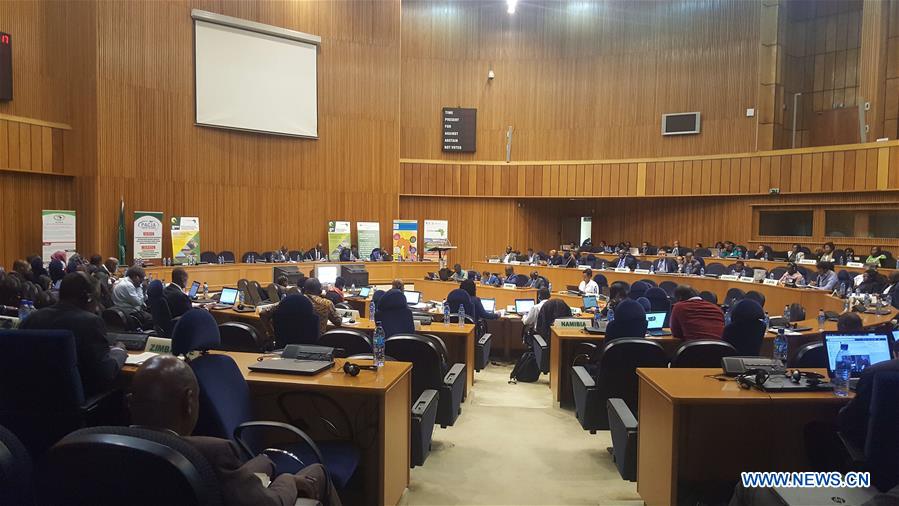
Participants attend the 8th edition of the Climate Change and Development in Africa Conference in Addis Ababa, Capital of Ethiopia, on Aug. 29, 2019. African experts and policymakers on Thursday urged to reverse the current "lackluster approach" in the implementation of the Paris Agreement towards tackling the adverse impacts of climate change. (Photo by Shiferaw Tadesse/Xinhua)
ADDIS ABABA, Aug. 29 (Xinhua) -- African experts and policymakers on Thursday urged to reverse the current "lackluster approach" in the implementation of the Paris Agreement towards tackling the adverse impacts of climate change.
The experts and policymakers made the call during the ongoing eighth edition of the Climate Change and Development in Africa Conference (CCDA-8), which is underway at the headquarters of the African Union (AU) in Ethiopia's capital Addis Ababa from August 28 to 30.
The high-level climate-themed conference, which is co-organized by the AU Commission, the UN Economic Commission for Africa (ECA), African Development Bank (AfDB), and the Pan African Climate Justice Alliance, kicked off with strong calls from African ministers and experts to reverse the current uninspiring approach to implementing the Paris Agreement.
"Many African countries have submitted ambitious Nationally Determined Contributions to Climate Action (NDCs), showing that African leaders have made strong commitments to tackle climate change while striving to meet their national development agendas," Frehiwot Woldehanna, Ethiopia's State Minister of Water, Irrigation and Energy, told the high-level meeting.
The Ethiopian state minister also noted that the East African country, whose electricity system is dominated by hydropower, was one of the first countries to submit its NDC leading up to the Paris Agreement and "was one of the first countries to ratify the agreement."
Woldehanna also stressed Ethiopia's strong commitment in the fight against climate change, in which the Climate Action Summit, which is being organized under nine action areas, one of which is the energy transition being led by Denmark and Ethiopia.
"Yet, despite the efforts on the ground, climate-induced frequent and more intense droughts "are putting our energy security and reliability at risk, with significant economic and social impacts," the state minister stressed.
The three-day climate-themed continental conference is being held under the theme "Stepping up Climate Action for Resilient Economies in Africa -- a Race we Can (and must) Win."
James Kinyangi, Chief Climate Policy Officer at the African Development Bank (AfDB), also echoed the Ethiopian state minister's call, as he emphasized the first urgent action is "to build resilience and adaptation to the adverse impacts of climate change for the most vulnerable communities across Africa."
Having signed and ratified the Paris Agreement, nearly all African countries "are now committed to Climate Action in support of building resilience through early warning systems, comprehensive risk assessment and management, and risk insurance," Kinyangi said.
"The time is now to translate the agreement into concrete action, to safeguard development gains and address the needs of the poorest and most vulnerable," he added.
The Paris Agreement, which was signed back in 2016, is an agreement within the United Nations Framework Convention on Climate Change, dealing with greenhouse-gas-emissions mitigation, adaptation, and finance.
Aida Opoku-Mensah, at the UN ECA, also noted that Africa contributes the least to global emissions but it is "already suffering the most adverse impacts from climate change."
"The continent contributes less than 6 percent of emissions, with per capita emissions of only 0.8 tons per year, well below the global mean of 5 tons, and far lower than for other regions such as Europe and Asia," Opoku-Mensah said.
Opoku-Mensah further indicated that the latest edition of the Climate Change and Development in Africa Conference is a "special event" as it being held ahead of the forthcoming Climate Action Summit, which is calling for urgent and concerted global action to fight climate change.
"This is the last wake-up call to all countries to raise their game and step up climate action for multiple social, economic and environmental wins," she stressed.